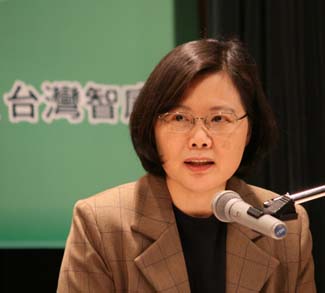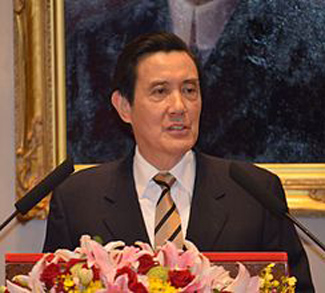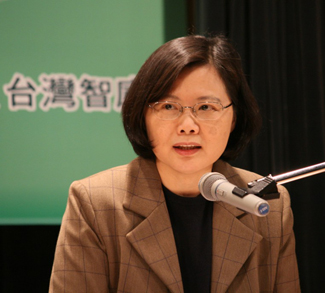It was nothing short of a landslide. As polls closed at 4:00 PM on November 29, Taiwan’s ruling Kuomintang (KMT) saw 9 of its existing 15 mayoral and county magistrate posts fall to the pan-green coalition led by the opposition Democratic Progressive Party (DPP). The biggest upsets included blowout losses in traditional KMT strongholds such as Taipei and Taichung.
Previously, the only time the KMT lost Taipei, it had been due to a split in the pan-blue vote in 1994. Not so this time, as DPP-aligned independent Ko Wen-je thrashed the KMT’s Sean Lien by a margin of over 16%. Even where the KMT managed to hold onto power, it did so barely scraping by. By the time DPP chairperson Tsai Ing-wen retired for the night, her underdog coalition was set to govern 60% of Taiwan’s population.
The elections produced a media storm around the globe. No sooner were the winners announced than Western media outlets such as Reuters, CNN, and The New York Times began analyzing the opposition’s blowout victory. The contemporary wisdom promoted by Western journalists holds that this election was a referendum on current president Ma Ying-jeou’s signature policy of appeasement toward Beijing. Others more familiar with the situation inside Taiwan have refuted the China factor as being an oversimplification, reminding readers that these were local elections focused on local issues rather than foreign policy.
One the one hand, these analysts are right. While the China threat looms large in the minds of the Taiwanese public, the debates during this electoral cycle centered mostly on local issues such as food safety and rising property prices. On the other hand, a significant portion of Taiwanese voters see increased integration with China as a leading cause of many of their current hardships, making this election precisely about Ma’s China policy, though not necessarily for the geopolitical reasons explained by Western journalists.
A Verdict Against Ma’s China Policy
The KMT’s pounding in last month’s local elections reflects growing distrust in the new generation of Taiwanese voters towards the ruling party. Nowhere is public disillusionment more evident than in the conciliatory China policy that Ma Ying-jeou has pursued over his six years as president. Taiwan-China ties have improved markedly since 2008, as Ma has redefined cross-strait relations by signing more than 20 agreements with China.
Nevertheless, the next generation increasingly views these agreements as benefiting only the rich at the expense of the average citizen. Furthermore, they fear that the agreements have led to an over-reliance on China economically that could eventually give Beijing sufficient leverage to force the island, which it claims as part of its territory, into unification.
Nowhere is the economic salience of the China factor better showcased than in the Sunflower Movement this past March, in which activists occupied the legislature for 17 days to stall the ratification of a deal promoting cross-strait trade in the services sector. While Western analysts viewed the event mostly through the lens of politics, at the protest site it was clear that economic concerns trumped the sovereignty issue among many, if not most, protesters.
Though not all the public’s frustrations relate to China, the sweeping policy changes and the widespread belief that they only benefit the wealthiest Taiwanese contribute to the KMT’s image among many as an elitist rich man’s club that is uninterested in the livelihood of the average citizen.
A Lasting Trend?
The shock and awe with which the DPP swept to victory show that this election was probably no fluke. Rather, it implies that pan-green dominance may have just become the new mainstream, at least for the foreseeable future. This means that a pan-green president and possibly even a majority DPP legislature are likely to emerge from the general elections in 2016.
Today’s KMT is a broken party. President Ma’s approval ratings have languished since shortly after his re-election in 2012, and the latest election results show that his fellow party members are not faring much better. Following Ma’s resignation on Wednesday as party chief, the KMT finds itself with no leader and a politically bankrupt policy that the public is no longer buying.
The DPP, on the other hand, has never been stronger. Fresh off the party’s most sweeping electoral wins ever, momentum is on its side. Its new-found pragmatism and ability to do what is needed to win is nowhere more evident than in the Taipei mayoral race, where the DPP wisely decided not to field a candidate and instead threw support behind popular independent Ko Wen-je, who handily defeated Sean Lien, son of former vice president and KMT honorary chairman Lien Chan.
The KMT will eventually manage to reconstruct itself, but the process will likely take years. The DPP fell into a similar predicament leading up to the 2008 general elections, due to the unpopularity of then-president Chen Shui-bian. The DPP lost those elections in a landslide to Ma and the KMT, and the shadows of Chen’s corruption and failed China policy continued to follow DPP candidates through the general elections of 2012.
In an effort to regain its historical dominance, the KMT will have to find a leader and an ideology that can unify a shattered party and address the concerns of the modern voter. Doing so will require it to reassess certain key policies, particularly the unpopular aspects of its outreach to Beijing. Thus, when the KMT manages to regain voter confidence, it will do so partially at the expense of its China policy. Going forward, it is hard to imagine cross-strait integration continuing to develop at the current pace.
Consequences for Cross-Strait Relations
The effects of last month’s elections on Taiwan’s cross-strait policy may begin to be felt immediately, with KMT legislators up for re-election in just over a year becoming less enthusiastic about pursuing unpopular agreements with China. The effect will likely be more profound following the general elections, assuming the DPP fares as well as expected.
This changing political tide will frustrate China and most likely increase tensions between Beijing and Taipei. This will be all the more probable if the DPP gains control of the presidency or legislature in 2016 as expected. China’s leaders make no secret of their distaste for the DPP, which they believe still seeks formal independence for the island that Beijing claims as its own.
However, the idea that scaling back today’s uber-friendly China policy will bring as much strife as Chen Shui-bian’s threats to declare formal independence a decade ago seems out of touch with the current state of cross-strait relations. Tempers may flare, and nasty words may be exchanged from time to time, but the overall constructive nature of today’s cross-strait relationship is poised to continue.
The greatest reason to expect continued stability across the Taiwan Strait is that each of the parties involved recognizes peaceful coexistence as essential to their political legitimacy. In Taiwan, essentially all mainstream political figures now favor some form of cooperation with Beijing, as it is difficult to get elected otherwise. Talk of declaring independence has become so taboo following Chen Shui-bian’s polarizing presidency that DPP candidates now go out of their way to emphasize their support of the status-quo. The DPP has followed the KMT’s successful example of reaching out to Beijing, and recent years have seen China visits by former premier Frank Hsieh and Kaohsiung Mayor Chen Chu, as well as offers by DPP chair Tsai Ing-wen to meet with Mainland officials in Taiwan. Indeed, today’s DPP understands that, in order to get elected, it must maintain a proper balance of engaging with China while protecting the political sovereignty and economic interests of the people of Taiwan.
On the other side of the Strait, the political legacies of Presidents Hu Jintao and now Xi Jinping are so deeply tied to this engagement policy that Xi’s government will do all it can to portray the policy as a success. The Chinese Communist Party’s (CCP) pragmatism in shaking hands with their historical nemesis the KMT shows that they are willing to partner with sworn enemies when doing so is in their interest. And Beijing’s calm yet cautious response to the latest round of elections indicate that it is at least open to the idea of working with a relatively China-friendly DPP government as well. Of course, this assumes that the DPP does not pursue formal independence, a well-recognized red line that DPP politicians continually strive to prove they will not cross.
To be sure, disagreements, threats, and periodic setbacks will result from the policy shifts emerging from this election. Yet policy shifts such as these are not by themselves likely to reverse the trend of stability across the Taiwan Strait. While Taiwan’s stance toward China will likely harden to a degree in the coming years, it is reasonable to assume that, barring any unforeseen circumstances, stability, security, and a degree of cooperation will continue to prevail for the foreseeable future.




